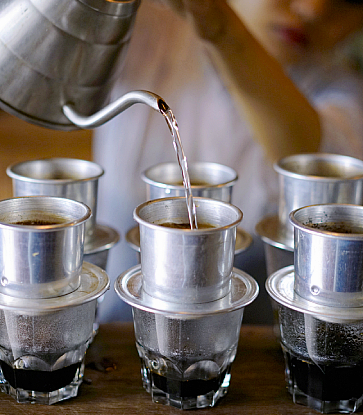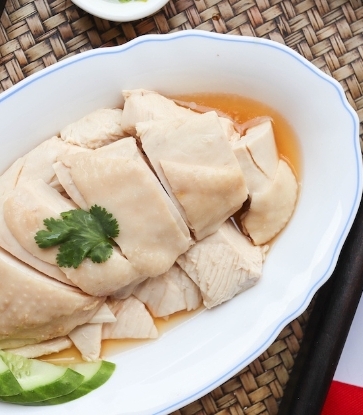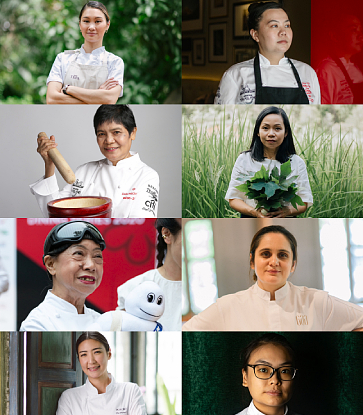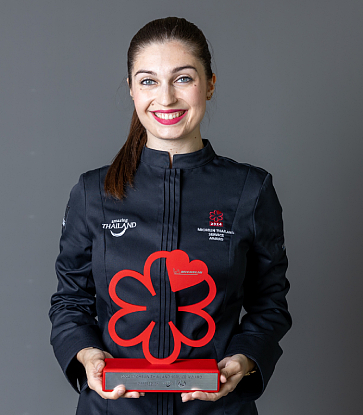Thailand is famous for its rich flavours and intense spices. It’s a land blessed with an abundance of natural resources from its farms, its forests, and its waters. And Bangkok, especially celebrated for its street food, is a multicultural melting pot where internationally celebrated chefs ply their trade.
With such a diverse gastronomic scene, Bangkokians are spoilt for choice. And when MICHELIN Guide arrived in 2018, Thailand joined the global fine-dining table.
Three hundred restaurants are listed in the 2021 MICHELIN Thailand Guide. Three-quarters of them have remained open during the pandemic – above the global average. But COVID-19 has been a catastrophe for the entire supply chain of Thailand’s food industry, from fine dining establishments and street vendors to farms and suppliers.
The uncertainty has crushed the spirits of many business owners. Bo.lan (One MICHELIN Star, MICHELIN Guide Thailand 2021) was the first well-publicised casualty. A handful of non-starred restaurants have followed. And there are whispers that some of Thailand’s award-winning chefs are considering relocating abroad.
Now, with the knowledge of what has worked in other countries, and with their own hard-won experiences, major restaurateurs are calling on the government to work more closely with them in a concerted effort to meet the continuing challenges they face.
We spoke to several of the chefs to find out how they’ve adapted and what they believe needs to be done to support the industry.

The backbone of society, jobs and the economy
The restaurant industry had grown steadily in the years leading up to the pandemic, driven by continuous growth in the country’s tourism and changing lifestyles, which meant families could afford a bigger appetite for new experiences. Thais ate out around 56 times a month, on average. And 81% of the Thai consumers surveyed planned to spend more or about the same as they do now on dining out and meal delivery in the next three years.Meanwhile, some 40 million international tourists visited the country in 2019 according to the Tourism Authority of Thailand, and Bangkok was one of the most visited cities in the world. These numbers were serviced by a highly competitive hotel and restaurant industry made up of about 320,000 restaurants and more than 54,000 hotels and resorts in 2019.
Contrast that with the picture shaped by the pandemic today. Only 6.7 million foreign tourists visited Thailand in 2020. This is a disaster for a country where more than 12% of the economy relies on tourism. The Thai Restaurant Association estimates the industry is losing up to 1.4 billion baht a day. Around 50,000 restaurants have shut down in the past two months, either temporarily or permanently. And some 500,000 workers have lost their jobs.

Feeling the impact– reduced hours
With strict social distancing restrictions, temporary closures, reduced hours, and a ban on alcohol sales, restaurants have found it difficult to navigate the uncertainty while continuing to pay staff and overheads. Most of the restaurants we spoke to rent their business premises. For many of them, survival may boil down to the strength of their relationship with their landlord.Chef Thaninthorn “Noom” Chantrawan at Chim by Siam Wisdom (One MICHELIN Star, MICHELIN Guide Thailand 2021) told us, “I negotiated with the landlord on the rent, and we gave more days off to employees.” This allows them to continue operating without letting anyone go.
Supinya Junsuta, Jay Fai, famed for her crab omelettes and for being the first Thai street food vendor to receive a MICHELIN Star, owns her property, established over 40 years ago. Responsible for 10 employees, not having to pay rent has given her some breathing space compared to her peers and the flexibility to adapt operations. “Since MICHELIN Guide arrived, we were so busy and didn’t have time to cook other dishes like Sen Yai Krob Rad Na and Sen Mee Krob Khua,” she said. “Now we have more time, due to fewer diners, we brought back the classic menu for our regulars.” Her daughter shared, “We also try to promote the restaurant and menu through social media daily. It takes zero financial investment. All you need is diligence and creativity.”

Conversely, fine-dining establishments like Two MICHELIN Starred Sühring, have found the restrictions a much more bitter pill to swallow. Branching out into food delivery was never an option for the twin-brother chefs.
Thomas and Mathias Sühring established a beautiful dining experience meant only to be enjoyed in person. Their 1970s villa is surrounded by a tropical garden that can be viewed from the classy dining room or so-called winter garden. And their creative German tasting menu is best enjoyed with the wine-pairing or wine choices guided by an expert sommelier.
Since the COVID-related restrictions began in March 2020, they have been closed for more than six months. They have done everything they can to hold on to their staff. But, like many others, they rent their premises, and with a payroll of 60 employees, it has been arduous.
“The spontaneous announcements about tightening or loosening restrictions have left us with little security for planning our business thoughtfully and on time,” Thomas said. “We used the time to reflect on our business and adjusted our service, the kitchen, and the overall operating policy.” Otherwise, they have been at the mercy of the pandemic and official policies.

Another chef keen to share his pandemic experience was Sardinian Alessandro Frau. He was forced to reduce opening his Italian restaurant Acqua (MICHELIN Plate, MICHELIN Guide Thailand 2021) in Phuket to just Fridays, Saturdays, and Sundays.
“We concentrate bookings on those days, so our (food) preparations are for only three days,” he said. This helped reduce some fixed costs and utility bills. He reduced staff hours to four days a week, but, most importantly, he has managed to keep everybody employed.
Nevertheless, the restrictions on serving alcohol and the turbulent year means they have been eating into their savings. “We applied for loans from the banks,” Frau said. “But they don’t lend to foreigners, because they fear we may run away from the country.” Banks are also nervous about dishing out loans in general during this period. For the restaurants, having no access to financing limits their ability to adapt or restructure. Probably the biggest blow for the industry has been the ban on the alcohol sales on premises.
Jérôme Leroy, the owner of MICHELIN Plate awarded French restaurant Indigo in Silom, Bangkok, explained that his margins are so low that, without selling alcohol, it’s not worth opening. “Who wants to eat a steak without red wine?” he asked. “Some businesses may be okay to risk hefty fines by selling booze illegally, but I’m not jeopardising my two-decade-old alcohol license.”

Alcohol: significant revenue for business and government
Alcohol is an important profit centre for restaurants. And fine-dining establishments in particular design their businesses and menus around the relationship between food and wine. According to the Thai Restaurant Association, 60% of profit in the restaurant sector comes from beverage sales, including alcohol.Founder of Fin Wine, Benjawan Wisootsat, a supplier to Le Normandie, Sorn, Sühring, R-Haan (all awarded Two MICHELIN Stars), Le Du (One MICHELIN Star), PRU (One MICHELIN Star and Green Star), Gaggan Anand (MICHELIN Plate), and many other MICHELIN-listed restaurants, said they have experienced a 30-40% revenue drop from 2019 to now. Fine-dining restaurants bring a lot of revenue to the country. “Alcohol, especially wine…has generated a major revenue for HoReCa [Hotels, restaurants, and catering] and supports the country with almost 10 kinds of tax and duty, helping to fund things like senior welfare, sports, and healthcare.”
The impact of pandemic restrictions on the purchasing patterns of Thailand’s drinkers is clearly illustrated by research from IWSR Drinks Market Analysis Limited. Stephen Turner, Commercial Director - Asia Pacific, told us the total on-premise alcohol sales, in bars, restaurants, and hotels, dropped by 42% in one year – from 918 million litres in 2019 to 540 million litres in 2020. Drinks bought at off-premise locations, such as supermarkets, convenience stores, and wine shops, increased by 10% from 1,854 million litres in 2019 to 2,052 million litres in 2020.
However, while the trend is for businesses to move to online sales and delivery services, another potential life-line was cut off for restaurants. Last December, the government introduced a ban on alcohol sales via electronic channels, citing the need for greater control over preventing alcohol sales before 5 pm or on certain public holidays under the Alcoholic Beverage Control Act.
There is also a newly proposed amendment to the Act that, if signed off, may be salt added to the industry’s wounds. Under the proposal, diners and restaurateurs could be fined from 500,000 THB to 1,000,000 THB, respectively for posting a photo of an alcoholic beverage online. This draconian law would put greater power in the hands of the authorities, invoke fear in business owners, and destroy the heart of the industry - not to mention greatly hinder the Thai economy.

A double-edged sword for governments
Last year, the Thai government implemented several economic stimulus measures to boost public spending but nothing directed specifically at helping the restaurant sector. With little to no financial aid, the government-imposed business and social restrictions forced many restaurants to adapt their business model, to lay off workers, or to shut down altogether.The importance of the industry can’t be exaggerated. Restaurants offer great diversity in employment for career professionals, migrants, students, and older workers and for those from major cities to remote, rural areas, where other economic opportunities may be limited. With so many out of work, the cost to society, businesses, and livelihoods could be disastrous. There’s no denying the enormity of the task that governments around the world face. Managing the effects of COVID-19 is a balancing act between keeping the economy alive and preventing a national health crisis.
Countries such as Vietnam, Taiwan, Japan, and Thailand, whose efforts to control the virus were held as exemplary last year, are now all struggling to contain second or third waves. Policies have been fragmented, and it appears no country has mastered the equation; no overall solution has been found.
In the United Kingdom, the government recognised the importance of the sector and distributed around 11 billion GBP (490 billion THB) to more than 880,000 small hospitality businesses. When a strict lockdown was lifted in August 2020, they encouraged people to support their local restaurants through an initiative called “Eat Out to Help Out”. The government funded food and non-alcoholic drinks discounts from Monday to Wednesday for a month.
And initially, the programme appeared to be a roaring success, with 84,700 restaurants participating and 100 million meals claimed. But research revealed that, without strict precautions, 'Eat Out to Help Out' may have caused a breakout of COVID clusters.
The Thai government has taken this third wave more seriously. Bangkok, in particular, has seen a spike in infections since April. And at the end of June, to the relief of many in the industry, the government announced a 7.5 billion THB (235,000,000 USD) package to help affected employers and workers.

Crisis breeds innovation
Tim Butler, Head Chef and part owner at Eat Me (MICHELIN Plate, MICHELIN Guide Thailand 2021), said the industry has been “put on the fast track to use local, such as sustainable fish, secondary cuts, carefully raised meats,” and believes that “rethinking local markets is going to be key to survival.” Restaurants have been forced to manage their stock more judiciously, minimising waste and selling food at discount prices.For restaurants who have the resources, they have more freedom to be innovative, experimenting with new lines of service and promotions.
One MICHELIN Starred Cadence by Dan Bark serves a fusion of Western and Asian cuisine. Chef Dan Bark explained they have developed several campaigns, including offering set menus based on à la carte items sold at special rates, implementing a gift certificate programme, and developing their non-alcoholic cocktail menu. They are also developing an online masterclass for their beverage programme.
Meanwhile, chef and owner Masato Shimizu of One-MICHELIN-Star Sushi Masato created bento lunchboxes for delivery as well as doing omakase at home during the first wave last year. And he has continued selling them during the periods their restaurants could reopen. Masato said, “Offering promotions for free delivery and also home catering were big hits.”
While the industry has seen a significant pivot to home delivery, this doesn’t work for many business models or cuisine types.
Chef Supaksorn “Ice” Jongsiri at acclaimed Southern Thai restaurant Sorn told us that deliveries before the pandemic made up less than 5% of their revenue. “At Sorn, we were always fully booked. But the cost of transporting ingredients from the South and being Thai food, we can't mark up the prices any higher.”

What’s next for the industry?
Chim by Siam Wisdom's Chef Chantrawan tried delivery services through the popular mobile apps, but it didn't work out. “We lost most of our revenue,” he said. “The government should do something about the delivery platforms that cut more than 30% into what we make and leave very little.”Meanwhile, in China, where Chef Chantrawan is opening his second branch, the government helped with transportation and food deliveries to make sure people stay home. They also helped to reduce business expenses by reducing their tax burden.
Jay Fai agrees that tax breaks for establishments like hers would be very helpful. “Small businesses rely heavily on that in times like these,” she said. “Please give us a chance to try to survive and be self-dependent.”
Acqua’s Frau feels that the blanket policies on service restrictions don’t recognise the differences between business models. He said the layout of fine-dining restaurants means that customers are usually socially distanced anyway, even in non-epidemic times.
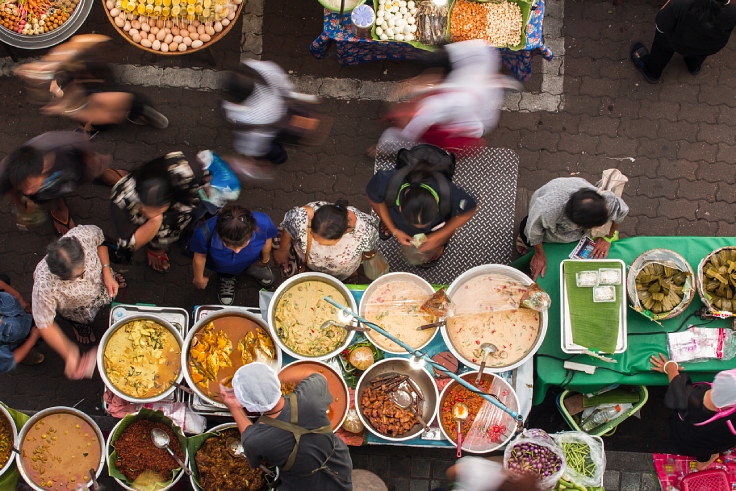
It’s widely recognised in the science community that the transmission of COVID-19 is far higher indoors than outdoors. And good ventilation reduces the danger. Businesses that have the space for outdoor dining should be allowed to continue operating. With the right safety measures in place, businesses could adapt their premises, make outdoor seating areas more comfortable for customers, and enjoy a consistent stream of revenue.
But Frau believes the alcohol ban is the thing that’s really killing business. “Customers don’t like to go to restaurants if they cannot enjoy the full experience,” he said. “…especially for restaurants like us and most of European restaurants.”
“We got the same alcohol ban as bars, pubs, and nightclubs,” he continued. “And it’s not fair to be compared to the restaurants that seat 300 people, where big groups of people meet there to drink until late.” Appealing to the government for a more considered response in partnership with the sector, he said, “They should make different categories (by restaurant type), and this should be done as soon as possible before it is too late. Or many other restaurants will not survive.”

Learning to adapt and thrive together
Communicable diseases originating from animals are as old as the history of agriculture and raising livestock. As the global population grows and urbanises, we will rely more heavily on science, governments, and supply chains to tackle these threats.The effects of this outbreak may last for years. So communities, businesses, and governments will need to learn and adapt. But most importantly, we need to work together to design nuanced policy responses that reflect the differences between sectors and types of business.
“We are fighters, and we will never give up,” Jay Fai and her daughter added. “We only hope they [the government] do their best to help everyone. Because, frankly, someday we won’t even meet the margins.”
American-born Korean Dan Bark shrewdly summed it up: “Thailand is a country [known] for its agriculture and tourism, yet there's no prominent support [for either sector]. We've been fighting the fight we'll never win…. but I believe it is important not to play the victim. We strive to still deliver the best performance and... to gracefully rise back up together with our food and beverage friends.”
Hero photo: © Anuwat Senivansa Na Ayudhya, Acqua, Jay Fai, Cadence by Dan Bark and MICHELIN Guide Thailand
Written by James Whiting and Pruepat Songtieng





